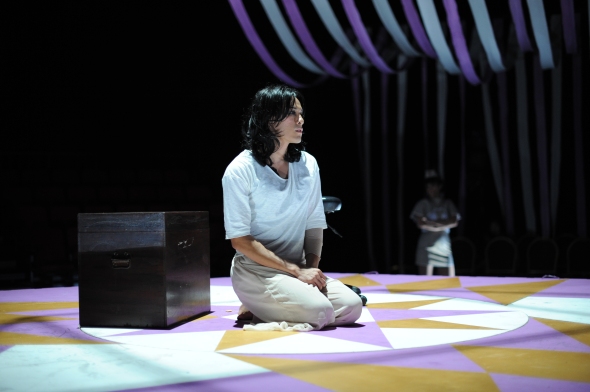By Ben L.
“You all both wearing striped shirts, you all twins is it?” one of the circus trainers announced over the microphone as my companion and I sheepishly walked past the audience to the other side of the Joyden Hall where our seats were. As we sat down, her colleague came over with a donation box, but my companion declined to take out his wallet.
“Aiya, Singaporeans all like that one lah.” she said in a disapproving tone while walking away to re-join her colleague.
This was the first indication that Toy Factory Productions’ Purple was not going to be your typical play. The multi-purpose space situated at the top of Bugis+ (formerly Iluma) had become a large circus tent, with a hexagon stage in the centre surrounded by seats in four distinct blocks. Exuding the feel of a no-holds-barred entertainment venue, the three circus trainers heckled one another and poked fun at members of the audience in a distinctive Singaporean accent, a very unusual yet entertaining way of opening the show. But more importantly, it set the tone of the play right from the start – the objectification of the protagonist as a source of casual amusement by the people around her.
Purple is based on the real life story of Maggie Lai, a Singaporean transsexual, and recounts her experiences from discovering her sexuality as a child to leading a new life post her sex-change operation. Filling her heels this time is Shane Mardjuki, who helms the stage from start to finish with her poignant tale. On a largely bare set, Maggie’s monologues become the heart and soul of the play and, much to the actor’s credit, the audience is treated to quite a compelling performance. On stage, she constantly tucks her hair behind her ear and sways coyly as she shares with the audience her dreams, laments her regrets from past failed relationships and suppresses the hurt and disdain that she received from the people around her.
While a little forced at times, Mardjuki’s female impersonation is still largely impressive to have me convinced – it’s no easy feat playing a woman for two hours, and the struggle between male and female genders is also evident and clear. If maintaining his voice and mannerism for the entire duration of the play wasn’t enough, Mardjuki also tried his hand at a pole-dancing feat, much to the applause of a shocked audience.
Joining the actor on stage are the trio of nurses, played by Elizabeth Loh, Matilda Chua and Rebecca Spykerman, who also alternate roles as unforgiving circus trainers and Maggie’s cousins from China. Representing the disapproving views of conservative citizens towards the LGBT community, the actresses deliver their best performance in the operating theatre scene, one that is also the most uncomfortable as they describe in vivid detail the entire process of a sex change operation. Adding to the gruesome nature of the scene was the stream of blood flowing from each nurse’s hands to the stage as they spoke, an act that further vindicated the pain that the patient had gone through but one that might have also gone a little overboard.
Prior to the screening, I had expected the girls to play a more substantial role instead of just dishing criticism on the sidelines, considering that the cast comprised only four actors However, the play’s largely favourable theme meant that subduing the negativity was a logical move and allowed Maggie to shine and connect with the audience with her lengthy tale of psychological and emotional hurt without too much distractions. There was also time for the trio to show off their vocal chops and acrobatic skills. But while they were impressive as amateurs in their little aerial stunts, the same could not be said about their singing. The meaningful lyrics of I Am Woman and Little Girl Blue were unfortunately overshadowed by the awkward timing and unpolished harmony.
Underneath Purple‘s main focus on the transsexual issue lies a more heartwarming theme of parental love and acceptance. Maggie tells of her father’s shock and dismay upon learning the truth of his only son’s sexuality, an account that is also heartbreaking given the shame that Maggie brings to her family. She also expresses her gratitude to her only pillar of support who stood by her nonetheless, especially in the face of adversity and suspicion from even members of their own family.
Maggie’s own display of filial piety also contrasts the strong objectification of the LGBT community at the beginning. It strikes home the critical point that transsexuals, like us, are humans too who are capable of loving and deserve unconditional love from their own family. Equally compelling is Mardjuki’s switch from a false female voice to a gruff male one as he conveyed the emotional battles his father faced having to accept that his only son had now become another daughter.
Purple certainly achieves its objective of educating its audience on the challenges that transgenders and transsexuals face today. 17 years after its first screening, the play’s themes are still very relevant in a relatively conservative Singapore society. The location of the play in Bugis also pays homage to Maggie’s history as a prostitute in Bugis street during her early years as a transsexual. Purple does not attempt to forcefully eradicate the negativity; rather it offers audiences a glimpse into the life of a transsexual, giving them a better understanding of the challenges faced and leaving them to answer their own doubts, if any.
PURPLE runs till August 18 at the Joyden Hall, Bugis+. Tickets available at SISTIC.


